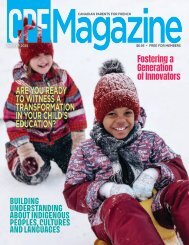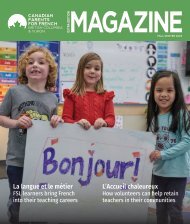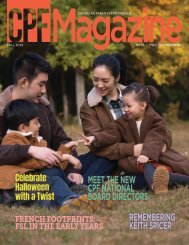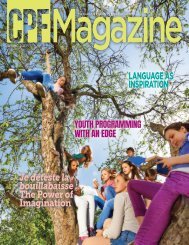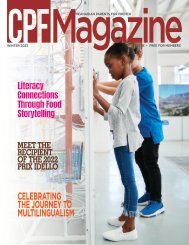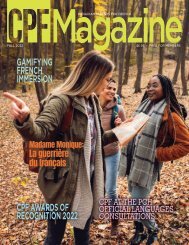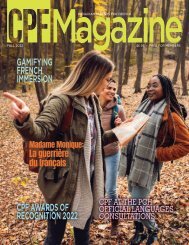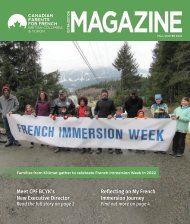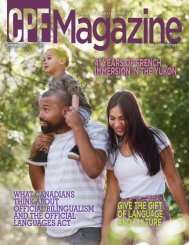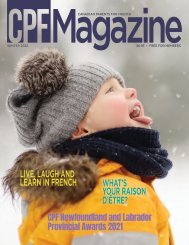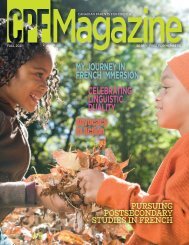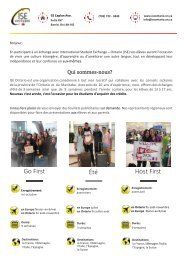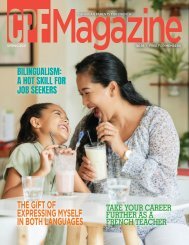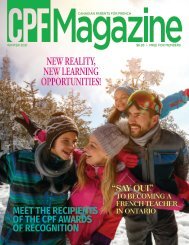CPFMagazine Fall 2019 Issue
A national network of volunteers, parents and stakeholders who value French as an integral part of Canada. CPF Magazine is dedicated to the promotion and creation of French-second-language learning opportunities for young Canadians.
A national network of volunteers, parents and stakeholders who value French as an integral part of Canada. CPF Magazine is dedicated to the promotion and creation of French-second-language learning opportunities for young Canadians.
Create successful ePaper yourself
Turn your PDF publications into a flip-book with our unique Google optimized e-Paper software.
CONSULTATIONS, SYMPOSIA, AND REPORTS<br />
It’s Time to Modernize the Official Languages Act<br />
SUMMARY REPORT BY NICOLE THIBAULT, CPF EXECUTIVE DIRECTOR, NATIONAL<br />
<strong>2019</strong> marks the 50 th anniversary of<br />
the Official Languages Act (Act). The Act<br />
has undergone only one major revision<br />
30 years ago, in 1988. The current Act<br />
specifically outlines protections for the<br />
minority language community. It should<br />
play a key role in the lives of all Canadians<br />
since its purpose is to:<br />
n Ensure respect for English and French<br />
as the official languages of Canada<br />
in government and parliamentary<br />
institutions.<br />
n Support the development and vitality of<br />
official language minority communities.<br />
n Set out the powers, duties and functions<br />
of federal institutions with respect to the<br />
official languages of Canada.<br />
n Affirms the right in certain<br />
circumstances to communicate with<br />
and receive services from federal<br />
institutions in the official language of<br />
one’s choice and to work in English or<br />
French in federal institutions.<br />
The Act also gives individuals the right<br />
to express themselves in the language of<br />
their choice before the federal courts. It<br />
promotes English and French and supports<br />
the vitality of official language minority<br />
communities across the country, so that all<br />
individuals can enrich the country through<br />
their contribution.<br />
Yet, throughout the consultations<br />
undertaken in 2018-<strong>2019</strong>, Canadians<br />
identifying with the majority language<br />
group do not feel they are directly<br />
addressed. Modernizing the Act is an<br />
opportunity to ensure that it meets the<br />
needs of today’s diverse Canadian society,<br />
responding to the increased demand for<br />
French second language (FSL) learning<br />
programs across the country.<br />
As the Government of Canada has<br />
set an ambitious target, to increase our<br />
national bilingualism rate from 17.9% to<br />
20% by 2036, Canadian Parents for French<br />
offered five main recommendations<br />
during the many consultations:<br />
A. Incorporating a new section to establish<br />
access to FSL education as a right or<br />
guarantee for non-rights holders;<br />
B. Broadening the definition of<br />
“francophone” and of “minority linguistic<br />
community” in Section 32(1)2(a) to be<br />
inclusive of Canadians whose mother<br />
tongue is not French but who are French<br />
speakers and are interested in accessing<br />
services in French;<br />
C. Expanding the Act to be more<br />
inclusive of and serve all Canadians,<br />
by modifying Sections 43(2) and 45 in<br />
order to guarantee consultation with<br />
organizations promoting FSL education;<br />
D. Expanding and strengthening the<br />
mandate of the Minister of Canadian<br />
Heritage (or designated Minister)<br />
(Section 43(1)e) to require and assist<br />
provincial governments to provide<br />
opportunities for FSL; and<br />
E. Officially recognizing the role<br />
played by French speakers (rights and<br />
non-rights holders) in the vitality of<br />
minority language communities.<br />
In May <strong>2019</strong>, the Government of<br />
Canada shared a Summary Document:<br />
Engaging Canadians as a Step Towards<br />
Modernizing the Official Languages Act.<br />
Regional trends are noted, key themes<br />
featured, with five broad areas<br />
of consensus having emerged:<br />
n The importance of including and raising<br />
awareness among linguistic majorities;<br />
n Official languages embodied in<br />
individual experiences;<br />
n The value of Indigenous languages;<br />
n The potential of technologies as a driver<br />
of innovation; and,<br />
n The place of culture in the Act.<br />
6 CPF MAGAZINE FALL <strong>2019</strong>



